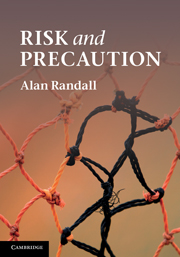Book contents
- Frontmatter
- Contents
- List of figures
- List of boxes
- Authors cited
- Acknowledgements
- List of acronyms
- Part I The precautionary principle – why so much fuss about such a simple idea?
- 1 Precaution as common sense: “Look before you leap”
- 2 Commonsense precaution or paralysis of fear?
- Part II Harm and chance – managing risk
- Part III Defining and justifying a coherent precautionary principle
- Part IV Precaution in action
- Part V Conclusion
- References
- Index
2 - Commonsense precaution or paralysis of fear?
Published online by Cambridge University Press: 05 June 2012
- Frontmatter
- Contents
- List of figures
- List of boxes
- Authors cited
- Acknowledgements
- List of acronyms
- Part I The precautionary principle – why so much fuss about such a simple idea?
- 1 Precaution as common sense: “Look before you leap”
- 2 Commonsense precaution or paralysis of fear?
- Part II Harm and chance – managing risk
- Part III Defining and justifying a coherent precautionary principle
- Part IV Precaution in action
- Part V Conclusion
- References
- Index
Summary
In Chapter 1, we saw how failures of foresight and decisive action allowed the hazards of novel interventions (asbestos and PCBs) to go unattended until remedies were enormously costly and remediation remains a work in progress. Clearly, the “charge ahead and, if necessary, clean-up the mess later” strategy can go horribly awry. Similarly, failure to heed the warning signs and take quick action has allowed greenhouse gases to accumulate to the degree that non-trivial human-induced warming seems already inevitable. The concept of precaution was introduced, and we saw that the precautionary principle, PP, had been adopted in one form or another by various governments and international bodies. Proponents often present PP as ordinary commonsense: extraordinary risks call for extraordinary precaution.
Nevertheless, there is plenty of opposition to the PP, and the passion of some of that opposition matches or surpasses the passion of PP proponents. In this chapter, we highlight the criticisms raised most frequently, and with perhaps the most vehemence, in discussions aimed at general audiences – PP, taken seriously, would create a regulatory nightmare; it ignores risk–risk trade-offs; it would stifle innovation, threatening the foundations of modern prosperity; and it is anti-science, because it privileges the irrational fears of the mob. To the extent possible, these criticisms are presented in the words of the critics with minimal editing. A more complete array of criticisms found in the scholarly and specialist literature is considered in Chapter 6.
- Type
- Chapter
- Information
- Risk and Precaution , pp. 17 - 28Publisher: Cambridge University PressPrint publication year: 2011



